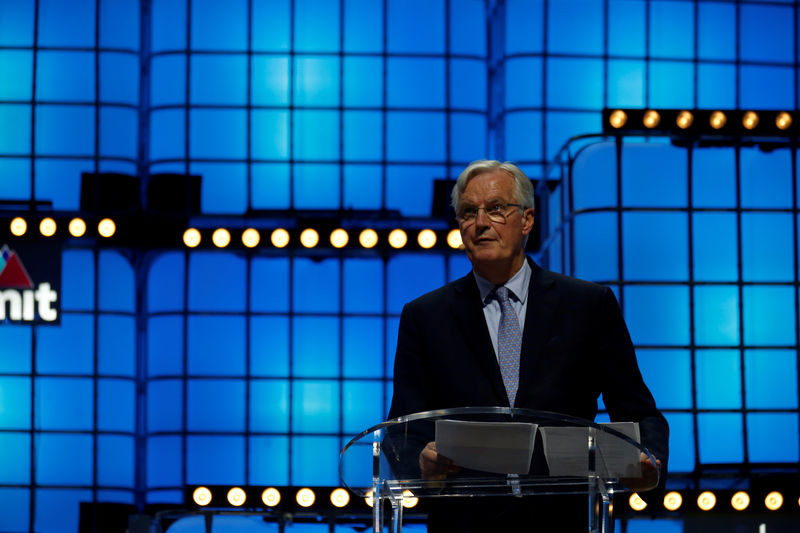By Catarina Demony
LISBON (Reuters) - The European Union's Brexit negotiator Michel Barnier on Tuesday predicted "difficult and demanding" negotiations with Britain on a future trading relationship, saying the bloc would not accept any "unfair competitive advantage" for London.
Britain is now scheduled to leave the EU on Jan. 31 after Prime Minister Boris Johnson failed to meet a previous Brexit deadline of Oct. 31 and instead called an election for Dec. 12, hoping to win a majority large enough to ensure the smooth passage of a withdrawal agreement he negotiated with Brussels.
The new deal would allow Britain to diverge further from EU rules than envisaged under a previous accord negotiated by Johnson's predecessor, Theresa May, helping him to win the backing of pro-Brexit lawmakers in his Conservative Party.
But Barnier signalled that the EU would defend its interests in the negotiations on a future relationship with Britain.
"The UK should not think that zero tariff, zero quotas will be enough," he said in a speech during Europe's largest tech event, the Web Summit, in Lisbon, listing state aid, social and environmental rights and taxes as top priorities for the European Commission in the negotiations.
"I know this negotiation will be difficult and demanding," Barnier said, adding that time would also be "extremely short" to negotiate the new partnership.
Under the withdrawal agreement, the EU and Britain have until the end of 2020 to negotiate their new relationship. Johnson has said he does not intend to request a further extension beyond that date.
Barnier reiterated his view that Britain could still end up exiting the EU without a divorce settlement, in a so-called 'hard Brexit' that economists say would be very damaging to both sides but especially for the UK.
"RISKS AND PROBLEMS"
Under Johnson's withdrawal deal, Northern Ireland would remain in the United Kingdom’s customs territory but tariffs would apply on goods crossing from mainland Britain to Northern Ireland if they were deemed to be headed further, to EU member Ireland and the bloc's single market.
"Brexit creates risks and problems in Ireland and Northern Ireland," Barnier said. "It's not about economy or trade, we are talking about people. But together we found a solution to the unique situation there."
Opinion polls put Johnson's Conservatives ahead of the main Labour opposition party in the countdown to the election but the political mood in Britain is febrile, divisions over Brexit are deep and the country could end up with another 'hung parliament' in which no party commands a majority.
A spokesman for Johnson said on Monday the government must continue to prepare for all possibilities, including that the country leaves the EU on Jan. 31 without a withdrawal deal.
"We should all remain vigilant and prepare for the possible outcome (of a no-deal Brexit)," Barnier said, adding that ratification of the agreement would bring "certainty", not only to businesses but also to EU citizens.

A recent survey showed the giant services sector stagnated last month, with concerns about Brexit affecting new orders.